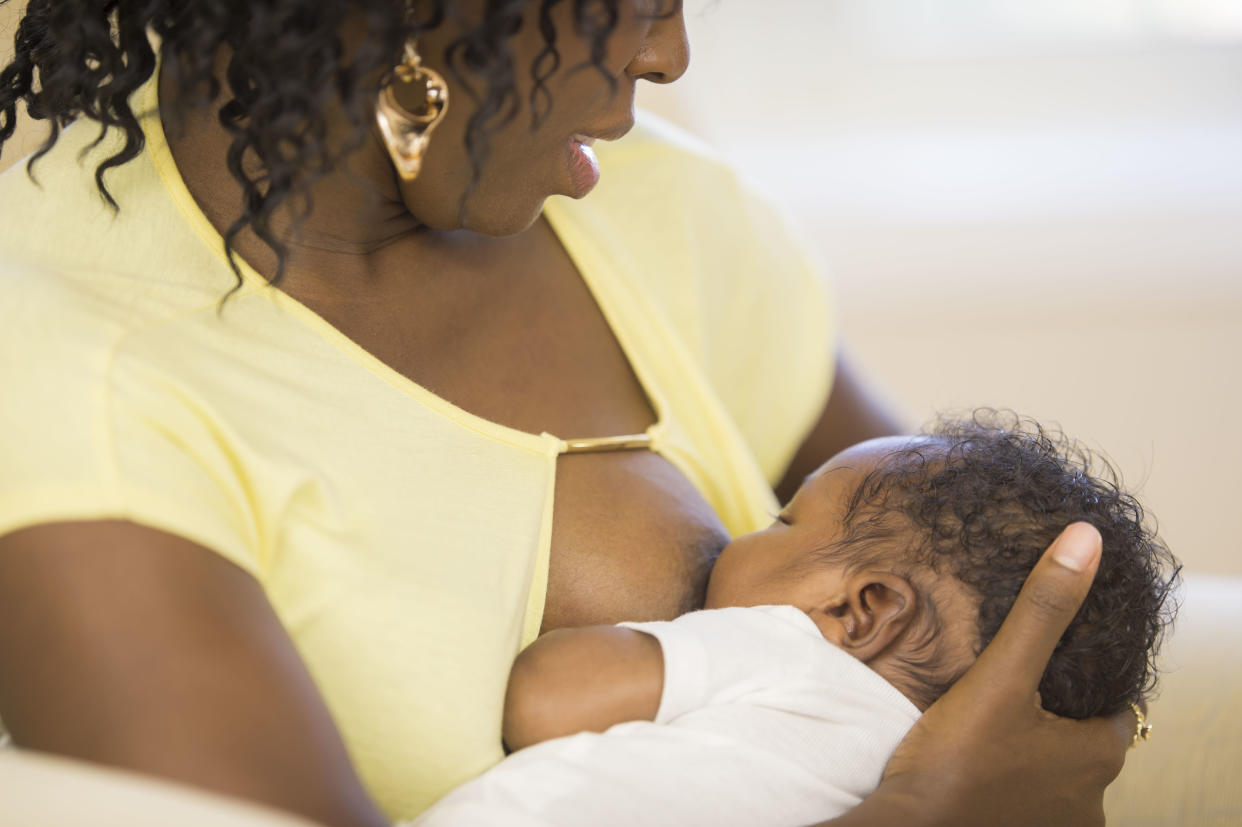It's Black Breastfeeding Week. Here's why the campaign is so important.

If National Breastfeeding Month — which lasts throughout August — is important, then Black Breastfeeding Week, which kicked off on Aug. 25 and brings with it a full slate of virtual events, is vital. “There have been racial disparities in breastfeeding rates for as long as data has been collected in this country — and that has huge implications on both infant and maternal health,” says co-founder Kimberly Seals Allers about the need behind the advocacy campaign, now in its eighth year, featuring a theme of “Revive, Restore, Reclaim!”
Indeed, according to the latest statistics from the Centers for Disease Control and Prevention, only 69.4 percent of Black mothers have ever breastfed their infants, as compared with 85.9 percent of white mothers, representing a 16.5 percent disparity. Similarly, while 73 percent of white mothers were still offering some breast milk to their babies at 3 months old, only 58 percent of Black mothers were doing so — and those numbers dropped, at the 6-month mark, to 62 percent for white mothers and 45 percent for Black moms. The percentages are even lower, particularly for Black women, when it comes to rates of exclusive breastfeeding at both 3 and 6 months.
“The disparity grows over time … but the benefits of breastfeeding increase with duration,” Seals Allers — a journalist, parenting expert, breastfeeding advocate, creator of the Mocha Manual and author of books including her latest, The Big Letdown: How Medicine, Big Business and Feminism Undermine Breastfeeding — tells Yahoo Life. “We don’t think of this about a lifestyle issue or quote-unquote choice — that’s another issue — but how we recognize it in our community is as a matter of life or death for our infants. It’s also a social justice issue that these babies are missing out on what can influence their health trajectory.”
The campaign’s sentiment is shared and is being buoyed by the many other Black mothers taking to social media this week to post stories and images of their breastfeeding experiences in honor of the special week, some calling out important statistics and historical reasons for the cultural barriers of nursing faced by some Black women.
Posts such as these have been flooding social feeds with supportive stories and with consciousness-raising facts, broken down here by Seals Allers and the Black Breastfeeding Week website:
The U.S. has a deadly combo of high Black infant-mortality rates and high rates of nutrition-related disease
Black babies die at twice the rate of white infants — 2.3 times more, according to 2019 CDC data. Further, African-American infants are 3.8 times as likely than white infants to die from complications related to low birth weight and have more than twice the sudden infant death syndrome mortality rates as white babies. “Black women disproportionately give birth, despite their best efforts, to babies who are too small, too sick and born too soon. That means our babies actually need breastmilk the most. For them, it is really about a lifesaving issue,” Seals Allers says, adding that, according to the CDC, increased breastfeeding among Black women could cut infant mortality rates by as much as half.
The lactation-support field is far from diverse
While lactation consultants can be lifesaving forces when it comes to supporting new mothers through their breastfeeding experience, they make up an exceedingly homogenous group, according to data from the U.S. Lactation Consultant Association, which shows the demographics as being overwhelmingly white. “This is a problem,” noted Seals Allers in a blog post for Black Breastfeeding Week. “For one, it, unfortunately, perpetuates the common misconception that Black women don’t breastfeed. It also means that many of the lactation professionals, though well-intentioned, are not culturally competent, sensitive or relevant enough to properly deal with African American moms. This is a week to discuss the lack of diversity among lactation consultants and to change our narrative. A time to highlight, celebrate and showcase the breastfeeding champions in our community who are often invisible.”
Cultural barriers, based on a history of oppression, hinder some Black women from breastfeeding
“When we talk about historical trauma, we have to go back to slavery,” Seals Allers says, “when women were stopped from breastfeeding their own children and forced to nurse those of slave owners … Black women could not demand to feed their own children.” And that, she says, was the source of a major interruption regarding how Black mothers feed their babies. In fact, she adds, many Black and brown women worked as wet nurses, because there were very few options for them to make a living. “It’s very relevant to this movement in our country around the history of oppression and its ripple effects,” she says. Particularly in the South, Seals Allers adds, the traumatic baggage around breastfeeding and its meaning is still strongly felt. “These ideas are still traveling with grandmas, who are the influencers in those families, so there’s still a lot of generational discomfort with breastfeeding … which perhaps reminds us of a time we’re trying to forget.” Furthering the difficulty, she adds, is what’s traditionally been the aggressive marketing of infant formula to Black and brown mothers.
The American Academy of Pediatrics, she adds, recommends babies are fed breastmilk, exclusively, for the first six months of life. “Black infants are missing out on the nutritional benefits, not to mention the social benefits, of breastfeeding, and it’s a public health and social justice issue,” Seals Allers says. “And so, as long as these disparities exist, Black Breastfeeding Week will exist.”
Read more from Yahoo Life
Want daily lifestyle and wellness news delivered to your inbox? Sign up here for Yahoo Life’s newsletter.


